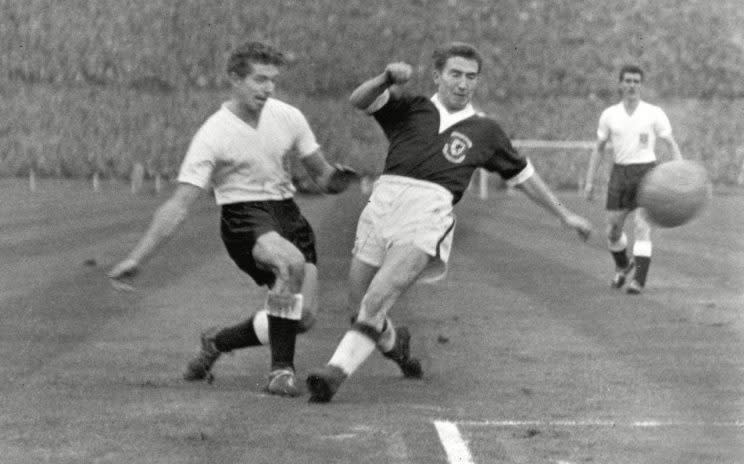Yahoo book review: It’s a wonderful life – My Story, by Cliff Jones

A bit of controversy always helps when a player writes their story. You’ll find none of that in the story written by Spurs Double-winner Cliff Jones – the club’s Welsh wing wizard long before a certain Gareth Bale rekindled memories. The optimism of the book’s title is reflected throughout the book – Cliff’s a nice guy and his approach goes along with the observation that if there’s nothing nice to say, then it’s not worth saying.
What that does, taken as a whole, is provide something that’s in danger of being lost. For in all the often-confected hype and faux controversy surrounding the modern game, the thing that is often forgotten is, well, that being a professional footballer is a wonderful life.
Jones’s story is of an ordinary lad from Swansea who ended up a star of the team many still say was the finest of the 20th century. He also played for Wales in the 1958 World Cup when a fine side was denied only at the quarter-final stage by Brazil and a 17-year-old Pele. As he says in opening the book: “I look on myself as one of the luckiest men in the world. Both personally and professionally, the little Swansea Jack has tasted the best life has to offer.”
Again, unlike many footballers who write their life story, Jones has much to draw on. Now entering his ninth decade, he takes us from his early days playing for boyhood club Swansea Town (now City), through almost signing for Arsenal before ending up at Spurs, the 1958 World Cup campaign, Spurs and the Double and some golden years in Europe, offering insight and observation on his experience without ever raking up controversy.

It’s an interesting, if straightforward, account, but towards the end of the book a couple of twists stand out. Dealing with that stage in a career when you’re on your way out is hard for any professional, and Jones manages to get this across while still demonstrating his trademark optimism. But what strikes the modern reader is his willingness to move down the divisions – firstly with a Fulham in freefall, then into the amateur game in the Southern League. For Jones, being able to continue playing was enough. Then, when he finally retires, Jones signs up for a college course to renew his skills as a sheet-metal worker, the job he did before football provided a living. Eventually, he’s offered a job as a PE teacher at a north London comprehensive school, a job he does with relish for years before retiring.
It’s all a long way from an age in which a player who merely signs for a top club is made for life. Who can imagine any of today’s superstars accepting a drop down, and as for any of them needing to get an actual job when they finish…
Reading this section is a reminder of how much the game has changed, and perhaps of how it’s easy to lose the sense of how special it is to get to play football at the top level. And there’s more. Dealing with the end of an illustrious playing career hits everyone in a different way, and for Jones it brought a battle with alcohol.
What must be remembered here is that talking about personal demons in public does not come easy to many men of Jones’s generation and background, and there’s a hint of that when introduces the account of this dark period of his life by saying “I shall explain in soul-searing, humiliating detail”. Interestingly, too, he does not link the hard-drinking football culture of the time with his subsequent descent into addition. “I was a fit young athlete and I coped with it easily,” he says of the ‘win or lose, on the booze’ culture, but when his career had finished: “I found I desperately needed something to replace those feelings and sensations, a substitute for the rarefied buzz of football, and that’s when I turned to alcohol.”

There’s evident distress in Jones’s feelings about what his drinking put the family he loves through and there are several moving stories told before Jones’s wife persuades old team-mate Jimmy Greaves to have a word. Greaves, of course, famously dealt with his own battle with the booze, a remarkable TV documentary entitled ‘My name is Jimmy Greaves and I am an alcoholic’ being the first time this writer can remember such a public figure so honestly confronting the issue. Jones acknowledges his debt to Greaves while acknowledging the AA maxim that you only stop drinking when you do it for you, not because you’re told to.
It’s a dark chapter in an otherwise upbeat book, and Jones finishes with an account of his travels with the Welsh team at the recent European Championships that shows the man’s continued love for the game and enables the book to finish on a note more in keeping with the rest of the tale.
You won’t find too much you didn’t know between these covers, but you will understand why Cliff Jones still has a twinkle in his eye.
Follow Martin on twitter @MartinCloake

 Yahoo Sport
Yahoo Sport 






































